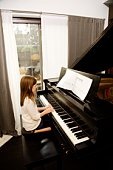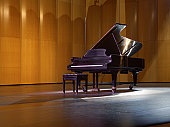
Home > Beginner Piano Lessons > Practice Plan
|
||||
Effective Piano Practice Plans
If we want to master a musical instrument you have to put in the time to get the desired results. It is very important with a musical instrument to put in the time to physically practice a piano. It is not called ‘practicing the piano’ for no reason. With a well placed together piano practice plan, it helps you stay disciplined, focused and achieve daily to long term goals. 1. When. First, decide how much time you can dedicate to practicing the piano every day. I know that we all have other activities in our daily lives that we need to attend to. You need to fit in some time out of your routine to practice the piano. It is advisable, no matter how skilled you are or at what level at learning to play the piano, to practice every day so that your mind can process the information. 2. How much time. Secondly, decide how much time you want to dedicate to practising. This depends on individual commitments to other tasks in your day as well as how fast you would like to master the piano. Decide if you want to spend half an hour, an hour or even more on practising the piano. The idea here is: regular practice. You don’t see an athlete train for 10 hours a day and slack off for 2 weeks.
3. Draw up a plan. Decide in which order you are going to practice your piano tasks and what you have learnt at piano lessons. Decide if you will start with practising your scales first and then move on to piano warm-up exercises and then on to your musical pieces and then finish up the plan with practising some music theory. This is not a definitive guide on what is best but our hands are instruments too and they also need to warm-up so it is better to start with some warm-up exercises on the piano. Whether the exercises include playing simple scales or other types of warm up drills. Once your fingers are warmed up, you can then concentrate on practising a musical piece. This makes your practice more effective as your brain can focus on reading the notes and not on working your fingers. To sum up. There are really no definitive guides on how to organise your routine plan. You will need to design one that best suit your needs and tweak it so that you get the best out of your practice time.
http://pianoplayerworld.com/PianoSystem.html
| ||||
|
Although every attempt has been made to make information as accurate as possible, we are not responsible for any errors that may appear.
 Practice always makes perfect or so they say. With a lot of practice most
things also become habit. Without a plan, you also don’t have a vision or goals to work towards and if you
have a plan you are committing yourself to having success when you
Practice always makes perfect or so they say. With a lot of practice most
things also become habit. Without a plan, you also don’t have a vision or goals to work towards and if you
have a plan you are committing yourself to having success when you 
 Here’s my recommendation; spend at least half an hour each day
practising and getting your fingers accustomed to the keyboard and moving your hands up and down the keys.
Even if you had a busy day, spending 15 minutes on your piano daily is better than practicing 3 hours in a day
once a week.
Here’s my recommendation; spend at least half an hour each day
practising and getting your fingers accustomed to the keyboard and moving your hands up and down the keys.
Even if you had a busy day, spending 15 minutes on your piano daily is better than practicing 3 hours in a day
once a week.



